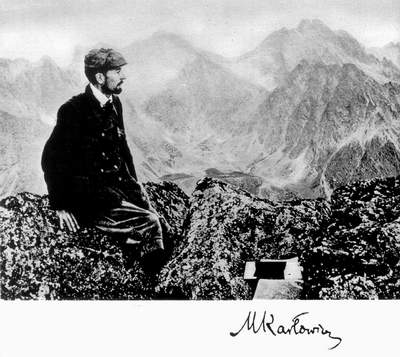Mieczysław Karłowicz (1876–1909)
Posted on 8 February 2009
Aged 32, he only wrote 14 opuses, but these put him firmly in the first league of Polish music, and among the more interesting personalities of turn-of-the-century European modernism.
An interesting chap, son of renowned ethnographer and linguist Jan Aleksander Karłowicz, co-author of a breakthrough Polish language dictionary (and incidentally, also a gifted musician), Mieczysław was also an outstanding early photographer and an avid mountain climber: he is credited with several new routes in his beloved Tatra mountains.
His short career as a composer came after several dire decades in Polish music, when a combination of political dependence, a lack of cultural institutions and funding, and Chopin’s prohibitive shadow resulted in a musical culture that had far less to offer than those of Bohemia or Hungary during that period. Karłowicz, as almost all good composers of the late 19th century in Poland, was educated in Germany, and he shaped an individual style that we see today as the missing link between Chopin and the rebirth of Polish music in the 1910s (with Szymanowski coming into the limelight).
Karłowicz’s premature death invites one of humanity’s favourite pastimes: trying to imagine what would have happened had he continued to compose. Imagine Mozart living on to his 60s and writing another 10 operas, or Beethoven composing a piano concerto for the young Liszt. It is futile, but also shows how much in the arts can depend on one individual, and how helpless we are faced with a hazardous event like the avalanche of 8th February 1909.
Karłowicz’s most renowned works are his Violin Concerto Op. 8 and six tone poems Op. 9 through 14. The former is a vigorous Mendelssohnian showpiece of Romantic writing, and I recommend it to those unfamiliar with Karłowicz. With the latter tone poems, he went quite a bit further, creating a mixture of ‘neo-Romantic’ (I don’t like the term but there’s no better one) Brahmsian expansiveness with a dissonant, restless drive à la Richard Strauss. (Here’s Eternal Songs Op. 10 as an example).
For me, however, Karłowicz’s most successful works are his songs with piano accompaniment. To his credit, instead of using drawing-room banalities, he called for poems by some distinguished Polish authors of the time (mostly Kazimierz Przerwa-Tetmajer). Early songs, such as Z nową wiosną [With the New Spring], are melodious, joyful, beautifully written strophic Schumann-lookalikes, while in the later ones Karłowicz takes on a more dream-like, chromatic style that really is not unlike Wolf’s Heine-Lieder (and perhaps even the later Nachtzauber) and the young Mahler’s songs. I wonder what would have happened had Karłowicz lived on…
Here is a small selection of Karłowicz’s songs by Poland’s premier baritone, Andrzej Hiolski. Here is another song interpreted by contralto Ewa Podleś, and here a rare archive 1930s recording. Sadly, I cannot find my favourite Karłowicz songs anywhere on the web: Pamiętam ciche, jasne, złote dnie or Smutną jest dusza moja but here is Zaczarowana królewna [The Enchanted Princess] sung (rather clumsily) by Adam Didur, the great pre-war Polish tenor.


